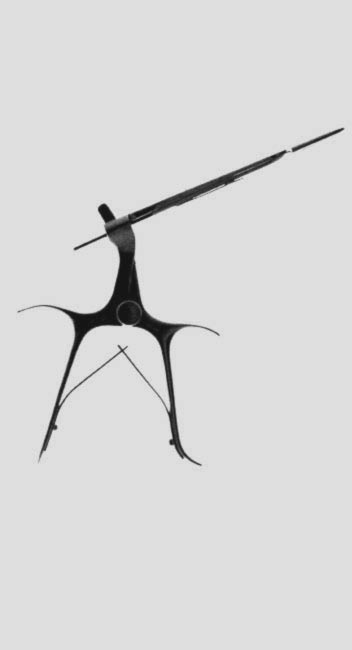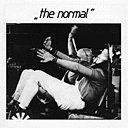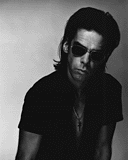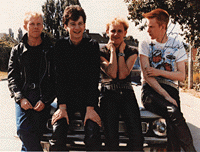


| THE BAND | ||||||||||||||||||||
 |
LABEL
PROFILE:
MUTE RECORDS
Daniel Miller - founder and current MD of Mute - speaks exclusively to Bill Bruce about running one of the last great (and truly) independent record labels... |
|||||||||||||||||||
| Any truly groundbreaking record label should have at its heart a maverick spirit, a desire to push back the boundaries of the music made available to us, and an almost innate ability to transcend fashion and fads. That's the theory, and as a principle, it certainly seems to hold true for those label bosses who are as inextricably linked with their labels as the artists themselves; Barry Gordy at Motown, Chris Blackwell at Island, Anthony H. Wilson at Factory Records. Having endured and confounded market trends and corporate muscle, Mute Records can join the list without question. | ||||||||||||||||||||
| What began as just another DIY label borne out of the post-punk frenzy for self-determination (which also gave us such indie label legends as Stiff, Rough Trade and Beggars Banquet), Mute Records have outlived many of their contemporaries and indeed many of their successors. It remains wholly independent while Creation, Go Discs!, Factory and a host of others have succumbed to major label take-overs. | ||||||||||||||||||||
| Yet
Daniel Miller, the man who to all intents and purposes is Mute Records,
has always been less high profile than the likes of Tony Wilson who still
dines out on his role as record label guru (without portfolio). Miller
rarely does interviews (and will almost never pose for a photo) so it's
odd that almost the first words out of his mouth are:
"Hey great, it's always nice to talk about Mute." |
||||||||||||||||||||
| Maybe
I had been expecting a more bluff and taciturn individual than the Daniel
Miller who quietly chats to me as the rest of Mute Records winds up for
the evening. I expected more steely demolishing of my interrogations than
his amiable head-scratching and honest self-depreciation: "It's
all been luck really" he
comments resignedly and repeatedly during the course of the interview.
I thought maybe he'd be more confrontational, happy to sneer at the 'business'
of music and bitterly bemoan Mute's lack of recognition while revelling
in it's resolutely uncompromising roster and style. Only Daniel Miller
isn't like that... and neither is Mute. People like me just like to think
it is.
“I know some executives from major labels really well, and I would count some of them as my friends" Miller explains. "Some of my staff have gone to work for majors and they haven't become my enemies." |
||||||||||||||||||||
| Alan
Wilder, late of Mute act Depeche Mode and now with Recoil,
sums it up best:
"I think it's easy to have a slightly romantic view of what makes an indie record label. If you go into the Mute offices and you see them trying to sell some of the music when nobody will play it, you can see the disappointment in their faces. They're not just sitting back thinking, "fuck you, we're just putting this record out and we don't give a toss". They're trying to make money as well, they're not that weird. On the other hand, there is an attitude of trying to sell music which is interesting, different and has something to say for itself." |
||||||||||||||||||||
| ' |
Ah, attitude. Was the vision behind Mute to be an electronic Motown? In the early eighties its predominately electro roster boasted the likes of Depeche Mode, Yazoo and Fad Gadget and became a haven for uncompromising noisenicks like Einstürzende Neubauten, Renegade Soundwave, I Start Counting and Mark Stewart. On the way, it drew in many of it's peers with a catalogue boasting the likes of Wire, Throbbing Gristle, Sonic Youth, Cabaret Voltaire and Can. Today, spread over a range of offshoot sub-labels like Novamute, Blast First, 13th Hour and Mute America, it's catalogue features everyone from Barry Adamson to Erasure, and from Dinosaur Jr to Diamanda Galás. |
' | ||||||||||||||||||
 |
 |
 |
||||||||||||||||||
|
|
|
|
||||||||||||||||||
| Characteristically
with Miller nothing is ever so simple:
"Vision? I think there was definitely a vision, although maybe not an electronic agenda. If Mute started out being an electronic label, it was because at the time electronic music was the only thing I was interested in. In truth, I felt the label should be about things which are unique. I definitely didn't want to have a band who sounded like someone else." |
||||||||||||||||||||
| The roster is certainly eclectic, more eclectic than many of the major labels who indulge a few "difficult bands" in hope of a Manic Street Preachers-like gestation into a unit-shifting credible rock or pop act. So is Mute the exception which proves the rule? Indie labels are precarious enterprises which lurch from profit to loss with alarming regularity, always looking to their laurels and living from release to release even after 10 or 20 years. What can be learned from this veritable old-timer of indie labels? Mute is now almost 20 years old, a remarkable achievement for a label with so few teeny pop acts and so many noisy old men and women who lean a bit on the weird side. | ||||||||||||||||||||
| NEW
LIFE
In 1979, a 28-year old TV repairman and full-time synth enthusiast named Daniel Miller, picked up a clutch of pamphlets on 'How To Start Your Own Record Label': "You could go a long way with a play on John Peel and a review in Sounds" he remembers. "There were only a few indie labels at the time but an awful lot more records came out. As more labels appeared, sales went down, although the market continued to grow." |
||||||||||||||||||||
| Now
aged 46, it's still been Miller's first and only job in the music business.
Until punk came along, he had been almost exclusively listening to Krautrock,
predominately German experimental acts like Can, Faust and later
Kraftwerk:
"I hardly bought an English or American record in those years," he confesses. "I'd become very bored with music because there was very little I liked. I travelled for a while and came back to London in '76 just as punk was starting to happen and that really excited me. I suppose it was the attitude and the approach I admired more than a lot of the music. I liked some of it although a lot of it was just rehashed rock music." |
||||||||||||||||||||
 |
' |
By this time, Miller had decided he wanted to make his own electronic music and performed under the guise of The Normal (whose J.G. Ballard-inspired track 'Warm Leatherette' was later a hit for Grace Jones): |
' | |||||||||||||||||
| "The technology was moving more quickly. To have a synthesiser in the '70's would have been so expensive but at this time, cheap Japanese synths and tape recorders were coming on the market." | ||||||||||||||||||||
| At the same time, bands like the Human League and Cabaret Voltaire appeared and the renaissance of post-punk pop music had begun. Like a lot of independent labels, Mute began as merely a way for Miller to release a modest number of records in a few shops with the wilful and innocent indulgence one enjoys when you own your own record label. Wasn't he intimidated by the way the big companies did business? | ||||||||||||||||||||
| "I didn't feel the slightest bit intimidated," he explains, "because I had no contact with it. I deliberately didn't go round trying to get signed to a record company to get finance. I wanted to put my own record out on my own label and that would be it. That was the end of it for me." | ||||||||||||||||||||
| MASTER
AND SERVANT?
Another remarkable thing about Mute is the way Miller has, over the years, become - at one time or another - a mixture of father figure / guru / fixer / confidant / producer and silent partner to his charges. Not in some Machiavellian or manipulative way but by sheer sleeves-rolled-up involvement in their work. Why has Miller so much input in his artists’ work (a hideous concept if practised by a chief executive at Sony)? |
||||||||||||||||||||
|
"It's funny, because in a way Daniel gets to have more say...by having less say" laughs Alan Wilder. "He gives the artist so much freedom that the artist actually wants to go to him and say, 'Well, what do you think? Do you actually like this?' I really value his judgement and I learnt a lot from him about production. He gives you the freedom and respect most people on Mute need." |
||||||||||||||||||||
| In
the end, Miller argues he has less direct involvement in areas like production
these days due to pressure of business and time:
"I think production is a difficult job and you have to give it 100%." |
||||||||||||||||||||
| All very well and good but suppose Daniel Miller turns around and tells one of his acts they've made a record which stinks? For example, how much input did Miller have with Alan Wilder's recent Recoil album 'Unsound Methods'? | ||||||||||||||||||||
| "I
would place more emphasis on a Daniel comment than I would on a review"
says Wilder.
"It doesn't mean that Daniel is always right but I do respect his opinion.
So if he said something wasn't very strong, I would think about improving
it. The thing is, Daniel is involved in every project at Mute, at every
stage. You don't just play him an end product and he marks it out of ten."
Is there slightly less freedom placed on acts like Depeche Mode and Erasure than on artists like Diamanda Galás? |
||||||||||||||||||||
 |
||||||||||||||||||||
| Andy Bell from Erasure recalls a period of time early on in Erasure's career when, after a flop debut album, prospects for the future of the band were fairly bleak | ||||||||||||||||||||
| "...I
think Mute were hoping we would pack it in because the first album had
cost them around £250,000 and yet Vince [Clarke] was adamant
that we should stick together, tour and do the next album on a budget."
Even now he admits there are some limits on the band: "I think that, although we can do what we like, we do have some restrictions which some of the artists on Mute don't have because we're more of a commercial venture." |
||||||||||||||||||||
| However
Miller disagrees with the perception of Depeche and Erasure being on the
front line in matters of the labels solvency:
"If anything, I try to protect them from that sort of thing. Depeche didn't have a manager for years and Erasure still don't so I filled that role for them. To be honest, at times I've probably not been as hard on them as I should have been." He also admits with a shrug that it never occurred to him to do things any other way: |
||||||||||||||||||||
| "I don't know how other people do it. Ivo Watts-Russell (Managing Director of 4AD Records, another long-serving indie) leaves his artists alone completely. He gives them more freedom than me. It depends. Recently, I 'phoned up an artist who had just mixed their own album to tell them it sounded shit and doesn't represent the record very well. And I thought he was going to punch me in the face! Because he had put a lot of time and emotional energy into it but in the end he agreed it could be better and decided to do it again. We try and get it right first time but if you hear a record and it doesn't sound as good as you know it could, then you have to redo it. That's all there is to it." | ||||||||||||||||||||
| Another
Mute artist, Alexander Balanescu - whose group The Balanescu
Quartet are famed for their string-led interpretations of songs by
Kraftwerk and David Byrne - is keen to stress the artistic
freedoms available at Mute. Especially when it came to recording the first
album of the Balanescu Quartet's own material, 'Luminitza'.
"There is a strong sense of trust. We had to do some pretty extensive remixing on parts of the record" he recalls, "and we were sending all these mad faxes to Daniel who was in New York. He just turned around and said, 'Yes'." |
||||||||||||||||||||
| Of
course such mega bucks indulgences with artists, be it the Happy Mondays
or My Bloody Valentine, can often spell financial disaster for a
label. The big question is why Mute didn't go the way of Factory and
Rough Trade amongst others. Daniel Miller himself can only theorise:
"We always had two bands." he admits bluntly. "We found Depeche Mode, who of course went on to be very successful, and then when Vince Clarke left them, he formed Yazoo who were instantly commercially successful. Then, when Yazoo split up Vince started Erasure." |
||||||||||||||||||||
 |
' |
During that time, other artists like Nick Cave & The Bad Seeds were developing into big selling artists. Maybe not in a pop sense but successful none the less. |
' | |||||||||||||||||
| "So,
it's luck!" he sighs, and adds with utter
modesty. "There's no skill in it. I didn't
get Vince out of Depeche and get him to work with Alison Moyet saying,
‘Hey you could be stars!’"
So business acumen isn't a factor in all of this? Well, again Daniel Miller downplays his competence: “I was lucky I hired good people, a good financial controller, a good business affairs controller, because I haven't got any personal business acumen other than instinct. I'm not financially or legally inclined.” |
||||||||||||||||||||
| He's
also less inclined to schmooze with the other chief execs., not through
snobbery or resentment as much as through boredom.
"I can't be bothered with it, but I do it. It's things like the BPI I'm actively not involved in because I think it's a talking shop for the majors, with a few token indie labels involved. Everything that's done is for the benefit of the majors and that's it." |
||||||||||||||||||||
| So
it must be a worry. The trend of the big fish gobbling up the little fish.
If a major took over Mute, would that be it? Would Daniel Miller just walk
away and does the very prospect of such an event taking place give him
sleepless nights?
"Yep," he replies without hesitation, "I wouldn't walk away because I would be letting down a lot of people by doing that. I wouldn't enjoy it though...Well...actually I don't know what it would be like...I don't want to do it. I don't think it would be the right thing for Mute. But if I had to do it, I would try and make it work." |
||||||||||||||||||||
| One
gets the impression Daniel Miller is a Label Widow and he chuckles at the
description but agrees.
"Yes, I am. Do I regret it? I can't say because I don't know what the alternative is. I've seen an awful lot of relationships break down because of it. I've had relationships that have broken down because of it. But you make a decision at some point. If you're running a label it's a very high stress job that requires constant attention." |
||||||||||||||||||||
| CONSTRUCTION
TIME AGAIN
So you want to start a record label but you need money, an act and access to the media. How difficult can it be? I ask Miller if he feels we're on the verge of a resurgence of DIY labels again in the lead up to the Millennium. He's sanguine but acknowledges the difficulties and the limitations independent labels have to accept these days. |
||||||||||||||||||||
| "I
think it's much harder now. It costs a lot more. I think it depends on
the type of music you do. There are 1600 officially registered indie labels,
and I'd say at least 75% of these are dance labels because dance records
are cheaper than rock records. You can do it in a bedroom under a lot of
different names. With a band you have to tour, pay for videos etc. I think
you can be an effective dance label with very little money but I had a
full time job - which I didn't particularly enjoy but I was being paid
quite well. And Mute was something I wanted to do more than anything else."
So maybe you don't want to start a label but after reading this you think Mute is the label for you. Is it as tough as getting a hearing from the majors? |
||||||||||||||||||||
| "We
have a number of A&R sources at Mute. Our dance label Novamute
find their own acts. We have Blast First and they do the same. They
have to fit in with a certain criterion of quality which I think they do,
they also have to fit financial criteria but also if somebody wants to
sign someone they usually play it to me either out of respect or because
they want my opinion. I employ my people because I trust them."
I once heard a rumour that the first time Daniel Miller heard a Depeche Mode demo tape his only comment was "Yuk", before turning and walking out of the room. Fact or showbiz myth? |
||||||||||||||||||||
| ' |
Miller laughs: "No, that's not quite true. I was in the Rough Trade shop while they were hawking their tapes around. |
' |  |
|||||||||||||||||
|
They got introduced to me but I was in the middle of something else and I just looked up and saw these spotty New Romantics - I really hated that whole New Romantic thing - and I just walked out. Then I saw them play a few weeks later and thought they were brilliant. I didn't ever equate them with the spotty youths I'd met before. Although they've continued to remind me of this ever since!" |
' | |||||||||||||||||||
| The
history of A&R is fraught with historic blunders; Decca passing
on The Beatles, Island passing on Madonna and Chrysalis
snubbing U2. Are there any acts he wished he'd signed but missed
out on?
"Yeah, a couple. One is Stereolab. I think they would have been a great Mute band. Daft Punk would have also been great. I'm talking to a band just now - who I can't name unfortunately - who I hope to sign and will be the first act I've signed in over a year. I also think one of our big successes in the future will be a band called Peach who've already had a top forty single in America and they've got an album full of potential hit singles. Any act emulating what Depeche Mode have done is hard to imagine though. You never would have imagined them becoming as successful as they are." |
||||||||||||||||||||
| So
from one man's innocent pastime to globe-buggering record company juggernaut
in what seems like no time at all. Does Daniel Miller ever worry his label
will grow so big that a hands-on approach will no longer be a practical
policy?
"Yes, I do," he admits, "although there is still a big difference between us and a multinational, no matter what the perception might be. We don't own companies around the world. We've kind of hovered around the size we are now for the past few years and I don't see us expanding any further in the immediate future. We've got enough releases and enough staff," he smiles and adds, "I like to think I know who everyone is in the company at least well enough to say hello to, if not to go out to the pub with." |
||||||||||||||||||||